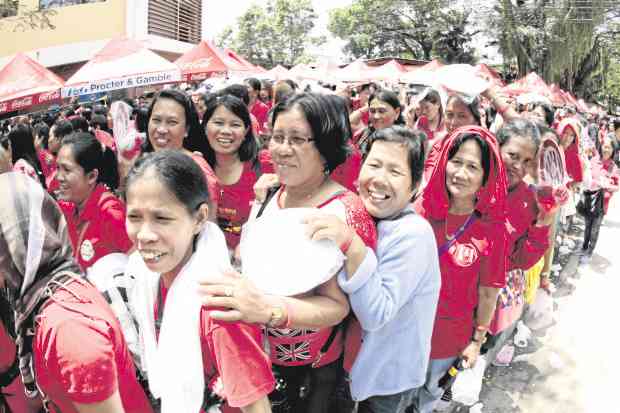In Davao del Norte, women learn financial, livelihood skills in ‘sari-sari’ stores

Coca-Cola Philippines and its partners have trained 83,000 women around the country in entrepreneurship and finance. —CONTRIBUTED PHOTO
TAGUM CITY—Like most “sari-sari” (variety) store owners, Cheriver Rosita had a simple way of recording sales: as long as her cash box wasn’t empty at the end of the day, then she did alright.
With a capital of P2,000, the 36-year-old mother of one put up a store near her house in Sto. Niño four years ago to augment the meager earnings of her live-in partner, a pedicab driver. But the lack of bookkeeping skills proved difficult. Instead of being rolled over to buy the next day’s merchandise, profits were inadvertently eaten up by the family’s personal needs. To keep business going, Rosita took out loans at outrageously high interest from neighborhood lenders.
Things became rosier, however, when the Tagum City Council of Women Inc. (TCCWI), a civic organization in Davao del Norte province, partnered with soft drink giant Coca-Cola Philippines and gave women livelihood and entrepreneurship skills training under its 5by20 Sari-Sari Store Training and Access to Resources (STAR) Program.
Under the program, women are given a 12-week module-based training in entrepreneurship with such topics as basic bookkeeping, inventory recording, financial management and gender development, said Gilda Maquilan, Coca-Cola Philippines sustainability manager.
“The Coca-Cola System globally supports the celebration of International Women’s Day,” said Coca-Cola Philippines president Diego Granizo. “Women are absolutely essential to the success of our business.”
Article continues after this advertisementSince its inception in 2011, the STAR program has benefitted at least 83,000 women nationwide. An additional 40,000 women are expected to be enrolled in the program this year, of which 5,000 come from the cities of Davao and Tagum.
Article continues after this advertisement“The way the program is designed, if a mother was unable to attend a session, she may inform the instructor and ask when she could catch up with the module. For instance, [if] she had to skip the training to attend a PTA (Parents Teachers Association) meeting, she can have a make-up session,” Maquilan said.
The program gets assistance from the Technical Education and Skills Development Authority and from local governments that help recruit and screen applicant-scholars.
Loans at low interest
The program also offers additional capitalization opportunities to the graduate-scholars through the First Community Cooperative based in Cagayan de Oro City, according to Maquilan. Loans at minimal interest can also be given to the scholars for additional capital, depending on their “capacity to repay,” she added.
“It’s helpful to our women, especially now that well-managed and well-capitalized groceries and convenience stores are (becoming dominant) in communities where sari-sari stores used to be king in retail,” said Alma Uy, TCCWI chair.
Uy said her group had been cited for posting near-perfect graduation rates of up to 97 percent among STAR scholars. “I’m strict with attendance because lessons are very helpful in the (women’s) daily business operations. I told the women we would cross them out from the rolls if they committed even a single absence,” she added.
Rosita doesn’t mind. “[The session lasts] about four hours every Sunday, so there’s really little reason not to attend,” she said. “The store is our laboratory and we can put into practice our new knowledge right away,” added this store owner whose gross capital is now at least P100,000.
Aside from more business skills, the program also trained her to become “a strong-willed woman who can decide and take risks,” Rosita added.